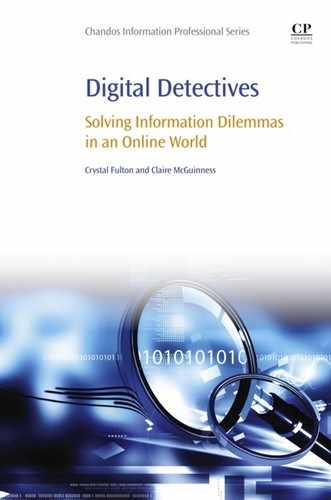Foreword
What is a Digital Detective, and how can you become one? While your first thought upon reading the title of this book might have been CSI, Criminal Minds, or even Sherlock Holmes, the textbook you are about to read is not really about catching villains, solving crimes, or analyzing crime scenes (although the skills and competences we discuss might certainly help!). Rather, our motivation is driven by a concern for catching errors, solving information dilemmas, and analyzing information resources. As students in the twenty-first century, your experience of higher education is very different from the experience of those born in the predigital era, and our aim with this book is to help you to deal effectively and efficiently with the challenges you may encounter on your path through the digital world.
Since the inception of the Word Wide Web in the early 1990s, the ways in which information is created, presented, accessed, modified, analyzed, shared, and communicated have undergone unprecedented change. We now live in a social media world, where speed, connectivity, and mobility are the name of the game. Study after study reveals a culture of constant connectivity—an “always on” lifestyle—where information is readily available at the touch of a button or the swipe of a screen. Learning is no longer bound by the walls of a classroom, but can take place wherever and whenever you choose, as long as you possess the tools, connectivity, and know-how to achieve your goals. Being digitally literate in the twenty-first century is a multifaceted state and may be defined in many different ways; from simply knowing which button to press to a deeper, context-based situational awareness, the spectrum is complex and wide. As “digital natives,”perhaps you feel the burden of expectation. Born into the digital era, and growing up with the Web, maybe you have a sense that you should know more, and be more skilled, when it comes to digital tools and resources. That you should somehow be a digital expert by virtue of the decade of your birth. This is a lot to live up to. As we know, however, there is no body of innate digital skills, attributes, and competences that sets one generation apart from the other; all of us must learn how to operate comfortably in this environment, and the greatest lessons of all come from figuring out how to solve the problems and dilemmas we encounter on a day-to-day basis. This is where we come in.
The dilemmas that we address in this book are drawn in no small measure from our experience as instructors in an educational institution that has become increasingly technology-enabled since we first began to teach. Throughout the years, we have observed our students as they grapple with the different gadgets and applications that have emerged, from laptops, smartphones, and tablets to the databases, e-books, and digital library collections that have transformed scholarly communication. Where our classrooms were once furnished with overhead projectors, now they are enabled with Wi-Fi and equipped with smartboards, audience response systems, and software for recording audio and capturing lectures. Much of our teaching has shifted to the virtual arena, with the roll out of learning management systems and digital learning objects such as e-tutorials. The world of education has changed forever—mostly for the better—and with it our learning behaviors. However, with change comes challenge, and the explosion of technology-enabled learning generates as many questions as it does solutions to problems. Here we strive to answer the questions that you might have about the best way to engage with digital resources in your learning and to instill a sense of confidence as you make your way through a world where digital is now the norm.
Using this book, you will develop and hone your detection skills by considering a series of meaningful dilemmas that you may encounter in your education and in life in general. Through our research and our interaction with many groups of students over two decades, we have identified the digital stumbling blocks that trip students up again and again: for instance, whether you can safely use Web sources for college work, how to avoid plagiarizing the work of others or using material illegally, and whether Google is an acceptable place to search for information. We avoid answering these questions with a simple yes or no; rather, we ask you to reflect deeply on your own instincts and behavior and to consider the reasons why certain courses of action are preferable to others when it comes to digital information. At this point, the skills, attributes, and competences required to be digitally literate have been well-documented in many different sources, but less so the different scenarios and contexts in which these skills should be applied. In becoming full-fledged digital detectives, it is our wish that you are never again caught out by a digital dilemma, in whatever circumstances you find yourselves. We hope that this textbook can take you at least part of the way there. The rest is up to you!
September 2015
..................Content has been hidden....................
You can't read the all page of ebook, please click here login for view all page.
